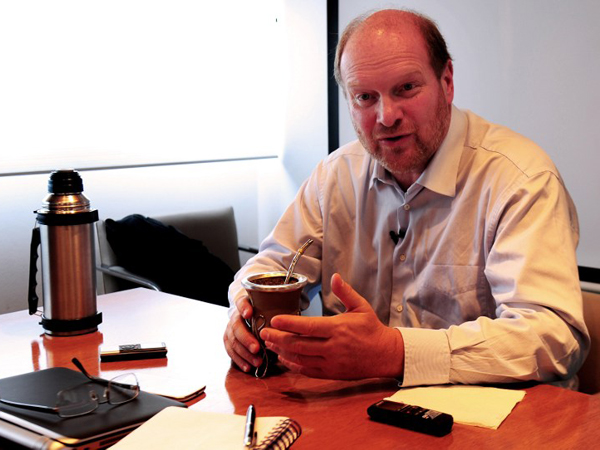
Businessman Gustavo Grobocopatel, known as the Argentine ‘Soy King’, speaks during a interview with AFP in Buenos Aires on August 29, 2013. AFP FILE PHOTO
BUENOS AIRES – Argentina’s Gustavo Grobocopatel, known as the “soybean king,” is head of one of the most powerful agroindustrial groups in South America, and quickly touts soy’s power in feeding people everywhere.
“In South America we work to feed the world,” Grobocopatel, 51, said during an interview with AFP.
“To criticize soy is to criticize the poor who have begun to eat,” he said.
But despite a penchant for agribusiness, the leader of the Los Grobo empire does not own land and says music is his true passion.
It is this untraditional outlook that has allowed the soy impresario to succeed.
Los Grobo, the largest producer of wheat in Latin America, deals not only in soy, grains and oilseeds, but also provides agri-input and technical assistance to farmers.
“We are farmers without land, because we rent. We have no work, because we outsource. And we have no capital because we lend money. All we have is management skills and knowledge,” Grobocopatel said with a smile.
“I am a Marxist, you might say.”
Argentina, the leading exporter of soybean oil “is able to feed 400 million people, as a country of 40 million people,” said Grobocopatel, whose ancestors came to the country from Russia in 1910.
Sitting in the office of one of his ventures, the agronomist drank mate, a typical caffeinated beverage from South America’s River Plate region, made from yerba mate leaves and sipped through a distinctive silver straw.
A perfect picture of the typical Argentine producer, with mate in hand, Grobocopatel’s global vision and national and regional strategy sets him apart from his colleagues in the industry.
His empire includes businesses in Argentina, Uruguay and Brazil – the countries that compete with the US as the world’s largest soybean producers.
Soy represents 25 percent of Argentina’s exports, totaling $81.2 billion in 2012.
“Without soy, the country would not have left” the deep economic crisis of 2001, Grobocopatel said.
Grobocopatel considers the soy boom “unstoppable, because it leads to better food consumption among poorer classes in the Asia Pacific and some African and Latin American countries where people are moving away from grains and basic foods and towards protein.”
“Before, in Asia, many people lived with a cup of rice a day but now can eat chicken and can eat pork,” he said.
Grobocopatel proudly boasts the region has become a “global technology leader in agriculture,” but said “much more research and development is needed in biotechnology, environmental agriculture and the use of robotics.”
He also defends direct seeding, a planting method that experts say conserves soil and is used on 91 percent of agricultural land in Argentina.
“Argentina is a country that has extremely widespread use of direct seeding, a great technological development that for the first time in 5,000 years will allow us to say that we’re giving our children better soil than our parents gave us. It’s a paradigm shift in the way we do agriculture,” he said.
Despite his enthusiasm, Grobocopatel says his true passion is not agriculture or technological innovation, but his professional folk music ensemble Cruz del Sur.
“I’m a musician, and it’s not a hobby, it’s my job. My hobby is the company,” said Grobocopatel, who studied singing for 30 years. “It’s my main thing.”